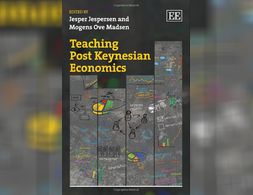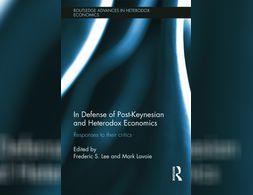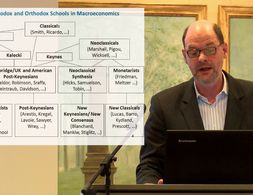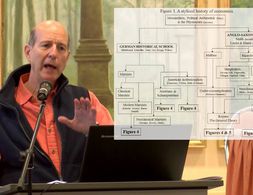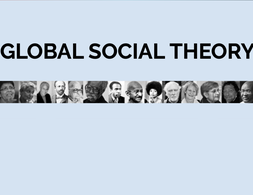841 Ergebnisse
In this paper the main developments in post-Keynesian macroeconomics since the mid- 1990s will be reviewed. For this purpose the main differences between heterodox economics in general, including post-Keynesian economics, and orthodox economics will be reiterated and an overview over the strands of post-Keynesian economics, their commonalities and developments since the 1930s will be outlined. This will provide the grounds for touching upon three important areas of development and progress of post-Keynesian macroeconomics since the mid-1990s: first, the integration of distribution issues and distributional conflict into short- and long-run macroeconomics, both in theoretical and in empirical/applied works; second, the integrated analysis of money, finance and macroeconomics and its application to changing institutional and historical circumstances, like the process of financialisation; and third, the development of full-blown macroeconomic models, providing alternatives to the mainstream 'New Consensus Model' (NCM), and allowing to derive a full macroeconomic policy mix as a more convincing alternative to the one implied and proposed by the mainstream NCM, which has desperately failed in the face of the recent crises.
Post-Keynesians focus on the analysis of capitalist economies, perceived as highly productive, but unstable and conflictive systems. Economic activity is determined by effective demand, which is typically insufficient to generate full employment and full utilisation of capacity.
What’s inflation? Why is it relevant? And is there an agreed theory about its roots and causes, or is it a contentious concept? That’s what this text is all about: We define what inflation actually means before we delve into the theoretical debate with an interdisciplinary and pluralist approach: What gives rise to it, what factors might influence it, and, consequently, what might be done about it?
This thoroughly revised and updated second edition provides a comprehensive guide to Post Keynesian methodology, theory and policy prescriptions. The Companion reflects the challenges posed by the global financial crisis that began in 2008 and by the consolidation of the New Neoclassical Synthesis in macroeconomic theory.
Mainstream economic theory has been increasingly questioned following the recent global financial crisis. Marc Lavoie shows how post-Keynesian theory can function as a coherent substitute by focusing on realistic assumptions and integrating the financial and real sides of the economy.
This brief but comprehensive account of the Post Keynesian approach to economic theory and policy is ideal for advanced undergraduate and postgraduate students in economics, public policy and other social sciences. Clear, non-technical and with a strong policy focus, it will also appeal to all of those who are dissatisfied with mainstream economics and wish to explore the alternatives.
After completing the workshop in Post Keynesian Economics participants should be able to describe the main differences and similarities between PKE and other schools of thought.
This book contends that post Keynesian economics has its own methodological and didactic basis, and its realistic analysis is much-needed in the current economic and financial crisis.
Post-Keynesian and heterodox economics challenge the mainstream economics theories that dominate the teaching at universities and government economic policies. And it was these latter theories that helped to cause the great depression the United States and the rest of the world is in.
This lecture by Prof. Dr. Eckhard Hein is part of the Introductory Lectures on Heterodox Economics at the 20th FMM Conference in 2016. It gives a good overview about where Post-Keynesian Economics can be located and what it is all about.
An overview of the last century economic theories asking what makes a heterodox economist. This lecture focuses on the evolution of the various academic traditions in economics. Lavoie presents his own typology for categorising seminal work within the post-Keynesian tradition while leaving space to acknowledge that categories are not binary, but can be used to help understand the different traditions, and how they have developed over the last decades.
In this video, the most famed biographer of John Maynard Keynes, Robert Skidelsky, explores the foundations of Keynesian economics
John Christensen from the Tax Justice Network addresses the Modern Monetary Theory idea that governments don't need tax revenues if they want to spend money. Doing so, he sums up the main points made by MMT proponents and their critics, and shows how MMT can be reconciled with another progressive economic narrative: "Modern Tax Theory". While MMT made valuable contributions to the policy debate on fiscal policy, it misrepresents the importance of taxation as a political matter and as a way to generate public revenues. This is where MMT steps in.
Tom Palley provides a very clear and insightful description of the post-Keynesian school of economics by tracing back its connections to the different historical schools of thought.
The idea of a Green New Deal was launched into popular consciousness by US Congressperson Alexandria Ocasio-Cortez in 2018. Evocative of the far-reaching ambitions of its namesake, it has become a watchword in the current era of global climate crisis. But its new ubiquity brings ambiguity: what - and for whom - is the Green New Deal?
Though apparently siblings from the same family, New Keynesianism and Post-Keynesianism are completely different schools of economic thought. As to why and in what regard exactly, that is what this book is all about. While the former is the official label of the current mainstream in economic research and teaching (rather than neoclassic economics, which would be more apt a term), the latter tries to preserve the original thinking of John Maynard Keynes, but also additional ideas and concepts of all those building on his work.
"The New Classical Macroeconomics "gives an accessible, rigorous, critical account of the central doctrines of the new classical economics, without unnecessarily difficult mathematics. It focuses on four central issues: the foundation of monetary theory; monetary and fiscal policy; labour supply and business cycles; and the attack on econometric models.
Jo Michell discusses some key implications of climate change regarding the standard policy prescriptions of Post-Keynesian economics, particularly relating to the possible necessity of consumption constraints and the presence of recurrent inflation.
The book provides an excellent comparative perspective on New Keynesian "New Consensus" economics and Post-Keynesian Economics at a beginner level. It also offers an interactive tool to understand how the economic models work, especially from a heterodox / pluralist perspective.
Since Daniel Kahneman won the Nobel Memorial Price in Economic Sciences in 2002, a new branch of economics gained academic and popular interest. That is, the so-called area of behavioural economics. However, some scholars claim that this new area of economics is not changing much of the mainstream paradigm. Why?
This fresh and unique textbook provides students and general readers with an introduction to economics from a new and much needed perspective, characterised by its uniquely pluralist, sustainable, progressive and global approach.
Unlike traditional textbooks, Introducing a New Economics contains the key concepts of pluralism, sustainability and justice. It provides students with the central questions covered by economics including resources, work, employment, poverty, inequality, power, capital, markets, money, debt and value.
Exploring Economics, an open-source e-learning platform, giving you the opportunity to discover & study a variety of economic theories, topics, and methods.
Geographical economics starts from the observation that economic activity is clearly not randomly distributed across space. This revised and updated introduction to geographical economics uses the modern tools of economic theory to explain the who, why and where of the location of economic activity. The text provides an integrated, first-principles introduction to geographical economics for advanced undergraduate students and first-year graduate students, and has been thoroughly revised and updated to reflect important developments in the field, including new chapters on alternative core models and policy implications.
In the interview, Robert Skidelsky discusses the emergence of political influence of a certain school of economic thought and how the success of an economic theory depends on the power relations in the society. He introduces the historical example of Keynesian economics and its replacement by liberal economic theory and policy in the aftermath of the Great Depression, and transfers this historical case to the dominant paradigm of austerity policies in the Europe as response to rising public debts caused by the Financial Crisis. He contrasts austerity policies with a Keynesian approach. Furthermore, he relates the targets of policy to the underlying power structures, for example when not the reduction of unemployment but the protection of financial capital is politically addressed.
Das Ziel des Green New Deal ist es, eine „soziale und ökologische Transformation unserer Wirtschaft“ anzustoßen (Giegold und Mack 2012, S. 40). Doch inwieweit werden bei der sozialen Transformation auch feministische Anliegen mitgedacht?
Potts (economics, University of Queensland) proposes evolutionary microeconomics as a synthesis of the collective schools of heterodox economic thought with complex systems theory and graph theory.
This book argues that mainstream economics, with its present methodological approach, is limited in its ability to analyze and develop adequate public policy to deal with environmental problems and sustainable development. Each chapter provides major insights into many of todays environmental problems such as global warming and sustainable growth.
Since the 1980s, the financial sector and its role have increased significantly. This development is often referred to as financialization. Authors working in the heterodox tradition have raised the question whether the changing role of finance manifests a new era in the history of capitalism. The present article first provides some general discussion on the term financialization and presents some stylized facts which highlight the rise of finance. Then, it proceeds by briefly reviewing the main arguments in the Marxian framework that proposedly lead to crisis. Next, two schools of thought in the Marxian tradition are reviewed which consider financialization as the latest stage of capitalism. They highlight the contradictions imposed by financialization that disrupt the growth process and also stress the fragilities imposed by the new growth regime. The two approaches introduced here are the Social Structure of Accumulation Theory and Monthly Review School. The subsequent part proceeds with the Post-Keynesian theory, first introducing potential destabilizing factors before discussing financialization and the finance-led growth regime. The last section provides a comparative summary. While the basic narrative in all approaches considered here is quite similar, major differences stem from the relationship between neoliberalism and financialization and, moreover, from the question of whether financialization can be considered cause or effect.
Karl Marx was the greatest champion of the labor theory of value. The logical problems of this theory have, however, split scholars of Marx into two factions: those who regard it as an indivisible component of Marxism, and those who wish to continue the spirit of analysis begun by Marx without the labor theory of value.
After completing the module, participants should be able to analyse the concepts of degrowth, ecological unequal exchange, Green New Deal, and embeddedness by applying theories situated within the fields of academic research of Ecological Economics and Political Ecology.
This paper attempts to clarify how the European economic crisis from 2007 onwards can be understood from the perspective of a Marxian monetary theory of value that emphasizes intrinsic, structural flaws regarding capitalist reproduction. Chapter two provides an empirical description of the European economic crisis, which to some extent already reflects the structural theoretical framework presented in chapter three. Regarding the theoretical framework Michael Heinrich's interpretation of 'the' Marxian monetary theory of value will be presented. Heinrich identifies connections between production and realization, between profit and interest rate as well as between industrial and fictitious capital, which represent contradictory tendencies for which capitalism does not have simple balancing processes. In the context of a discussion of 'structural logical aspects' of Marx's Critique of the Political Economy, explanatory deficits of Heinrich's approach are analyzed. In the following, it is argued that Fred Moseley's view of these 'structural logical aspects' allows empirical 'applications' of Marxian monetary theories of value. It is concluded that a Marxian monetary theory of value, with the characteristics of expansive capital accumulation and its limitations, facilitates a structural analysis of the European economic crisis from 2007 onwards. In this line of argument, expansive production patterns are expressed, among other things, in global restructuring processes, while consumption limitations are mitigated by expansive financial markets and shifts in ex-port destinations.
Global Social Theory is a large wiki-like project by Gurminder K Bhambra. Its central aim is decolonising and diversifying universities, production of knowledge, and social thought in general.
It represents a large online library divided into three parts: concepts, thinkers, and topics in/of social theory and decolonial thought. Every part comprises of short, introductory articles on an according theme. It may be helpful to give you a general overview (and a list of basic readings) on the most essential areas of social theory: caste, class, and race; civil society; racism; secularism; feminism and many others.
It may also allow students whose university curriculum in sociology, economics, or other social sciences lacks diversity to compensate for that.
Wir nutzen Cookies. Klicke auf "Akzeptieren" um uns dabei zu helfen, Exploring Economics immer besser zu machen!








